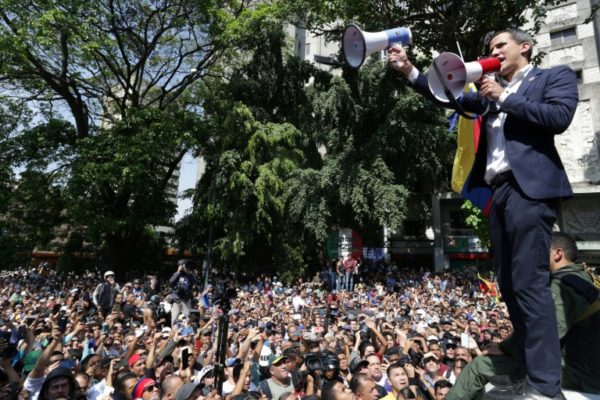Venezuelan opposition leader Juan Guaido brazen appeal Tuesday for a military coup or uprising against President Nicolas Maduro has failed as there was little sign of defection from the armed forces leadership.
Several dozen armed troops accompanying Guaido clashed with soldiers supporting Maduro at a rally in Caracas early on Tuesday, while large anti-government protests in the streets turned violent. There were injuries on the part of protesters as a military vehicle rammed into them.
But an uneasy peace had returned by Tuesday afternoon and there did not appear to be signs of an immediate attempt by the opposition to take power through military force.
Officials from U.S. President Donald Trump’s administration said three top Maduro loyalists had apparently been in talks with the opposition and indicated they would support a peaceful transition of power.
“They negotiated for a long time on the means of restoring democracy but it seems that today they are not going forward,” said U.S. envoy for Venezuela Elliott Abrams, while U.S. national security adviser John Bolton said: “All agreed that Maduro had to go.” Neither provided evidence.
They named the three as Venezuelan Defense Minister Vladimir Padrino, Supreme Court chief judge Maikel Moreno and presidential guard commander Ivan Rafael Hernandez Dala.
Venezuela’s U.N. Ambassador Samuel Moncada rejected Bolton’s remarks as “propaganda.”
Earlier on Tuesday, Padrino said in a broadcast, flanked by uniformed men, that the armed forces would continue to defend the constitution and “legitimate authorities” and that military bases were operating as normal. Moreno issued a call for calm on Twitter.
Guaido, in Twitter posts, wrote that he had begun the “final phase” of his campaign to topple Maduro, calling on Venezuelans and the armed forces to back him ahead of May Day mass street protests planned for Wednesday.
“The moment is now!” he wrote. “The future is ours: the people and Armed Forces united.”
National Assembly leader Guaido invoked the constitution to assume an interim presidency in January, arguing that Maduro’s re-election in 2018 was illegitimate. But Maduro has held on, despite economic chaos, most Western countries backing Guaido, increased U.S. sanctions, and huge protests by Venezuela’s opposition.
Tuesday’s move was Guaido’s boldest effort yet to persuade the military to rise up against Maduro. If it fails, it could be seen as evidence that he lacks sufficient support. It might also encourage the authorities, who have already stripped him of parliamentary immunity and opened multiple investigations into him, to arrest him.
Tens of thousands of people marched in Caracas in support of Guaido on Tuesday, clashing with riot police along the main Francisco Fajardo thoroughfare. A National Guard armored car slammed into protesters who were throwing stones and hitting the vehicle.
Thirty-six people were injured in the incidents, most of them hit with pellets or rubber bullets, said Doctor Maggi Santi of the Salud Chacao health center in eastern Caracas.
Maduro, a former bus driver who took office after the death of political mentor President Hugo Chavez in 2013, said he had spoken with military leaders and that they had shown him “their total loyalty.”
“Nerves of steel!” Maduro wrote on Twitter. “I call for maximum popular mobilization to assure the victory of peace. We will win!”

 Business1 week ago
Business1 week ago
 Football1 week ago
Football1 week ago
 Entertainment6 days ago
Entertainment6 days ago
 Entertainment3 days ago
Entertainment3 days ago
 Business1 week ago
Business1 week ago
 Latest1 week ago
Latest1 week ago
 Comments and Issues6 days ago
Comments and Issues6 days ago
 Business6 days ago
Business6 days ago

